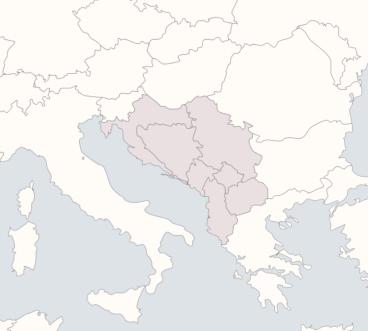Beginning with the staff observation of the first multi-party elections in Bosnia-Herzegovina in November 1990, the Helsinki Commission has consistently been the most active body in the U.S. Congress in terms of following developments in that country and advocating policy responses.
The first Congressional Delegation visit organized by the Commission took place in 1991, more than a year before the Bosnian conflict began. On several occasions, Helsinki Commissioners traveled on the military airlift providing humanitarian aid to Sarajevo during the course of the 1992-95 conflict, and several delegations traveling to neighboring countries like Croatia, Romania and Macedonia were undertaken to meet with Bosnian refugees, assess the potential for conflict spillover, and encourage compliance with internationally imposed sanctions on Milosevic’s Serbia.
The aggression and ethnic cleansing which took place in Bosnia-Herzegovina from 1992 to 1995 – and the war crimes, crimes against humanity and genocide which defined those policies – remain the most severe violations of OSCE principles in a participating State since the Helsinki Final Act was signed in 1975. The Helsinki Commission documented the atrocities and abuses through regular congressional hearings and briefings and used these fora as well as correspondence, press conferences, meetings with senior Administration officials and legislation to discuss and advocate policy responses.
Beyond the initial efforts to merely contain the conflict, Helsinki Commissioners pressed U.S. leadership for decisive efforts to stop it, including the use of NATO assets to end the siege of Sarajevo and protect UN-designated safe havens, as well as to lift the arms embargo imposed on Bosnia-Herzegovina. Other Commission responses included early and active support for the establishment of the International Criminal Tribunal for the former Yugoslavia (ICTY) to hold those responsible for atrocities to account, increased efforts to provide humanitarian aid, the greater acceptance of Bosnian refugees into the United States and the secondment of Commission staff to an OSCE spillover prevention mission.
The Dayton Agreement of November 1995 ended the Bosnian conflict. While concerned about some of the compromises made in Dayton for the sake of securing peace, the Commission continued a high-level of public activity to ensure that the core element of the agreement – Bosnia-Herzegovina as a viable state with its sovereignty and territorial integrity respected by its neighbors and with its citizens able to return to the country and their homes to begin the process of rebuilding, recovery and reconciliation – would be realized and sustained. The Commission focused particularly on the conduct of post-Dayton elections, including through their observation, assistance for democratic forces and independent institutions in Bosnia-Herzegovina, protections for displaced persons returning to areas where they now found themselves as highly vulnerable ethnic minorities, the exhumation of mass graves for the sake of criminal prosecution and ascertaining the fate of missing persons, and cooperation with the international tribunal by all states concerned. These efforts continue to this day.
New issues have also arisen, including the commemoration of the Srebrenica genocide, Bosnian aspirations to join NATO and the European Union, and the development of more effective government and adoption of constitutional reform measures that are necessary to make that happen. Helsinki Commissioners continue to press for continued U.S. engagement and international vigilance, including through continued legislative efforts in the U.S. Congress, to ensure the country completes the reform process and is integrated into European and Euro-Atlantic institutions along with its neighbors.
A 2009 visit was the latest formal Commission visit to the country and actively sought to encourage political reforms in Bosnia-Herzegovina. Although Bosnia-Herzegovina has demonstrated the capacity to implement reasonably free and fair elections, Commission staff continues to observe the electoral process, most recently in October 2014.
Staff Contact: Everett Price, senior policy advisor





